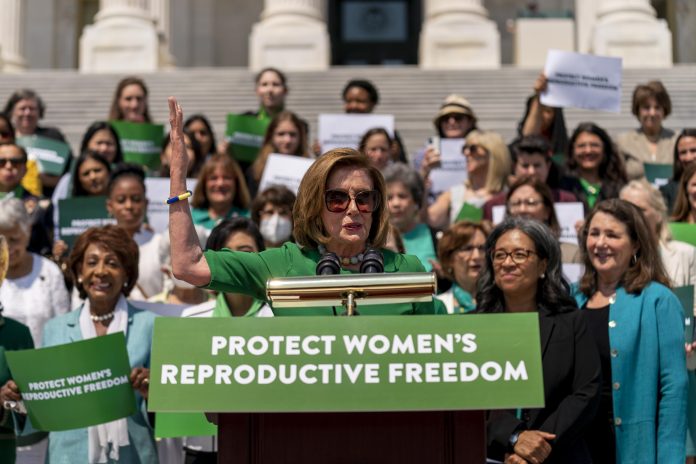The US House of Representatives has voted to restore abortion rights across the country, after the nation’s highest court last month overturned its landmark Roe v Wade decision, setting off protests and calls for action from lawmakers.
The bill has little chance of becoming law, with the necessary support lacking in the 50-50 Senate. Yet voting marks the beginning of a new era in the debate as Congress members, governors and legislatures grapple with the impact of the court’s decision.
The legislation passed 219-210. The House also passed a second bill to prohibit punishment for a woman or child who decides to travel to another state to get an abortion, 223-205.
“Just three weeks ago the Supreme Court took a wrecking ball to the fundamental rights by overturning Roe v Wade,” said House Speaker Nancy Pelosi ahead of the votes, gathering with other Democratic women on the steps of the Capitol. “It is outrageous that 50 years later, women must again fight for our most basic rights against an extremist court.”
Republicans spoke forcefully against the two bills, praising the Supreme Court’s decision and warning that the legislation would go further than Roe ever did when it comes to legalising abortion.
Urging her colleagues to vote no, Washington Republican Cathy McMorris Rodgers called abortion “the greatest human rights issue of our generation”.
She said the Democratic legislation “has nothing to do with protecting the health of women. It has everything to do with forcing an extreme agenda on the American people”.
The White House hailed the votes as an “important step”.
“These bills would ensure women’s access to essential health care services, regardless of where they live, and protect the bedrock right to cross state lines for medical care,” press secretary Karine Jean-Pierre said. “A majority of Americans across the country support them.”
She called Republicans’ refusal to support the bills “extreme” and “out of touch”.
By overturning Roe, the court has allowed states to enact strict abortion limits, including many that had previously been deemed unconstitutional. The ruling is expected to lead to abortion bans in roughly half the states.
Already, a number of GOP-controlled states have moved quickly to curtail or outlaw abortion, while states controlled by Democrats have sought to champion access. Voters now rank abortion as among the most pressing issues facing the country, a shift in priorities that Democrats hope will reshape the political landscape in their favour for the midterm elections.
READ ALSO: US’ Biden Confronts Saudi Crown Prince Over Khashoggi Murder, Expects Action on Energy
This is the second time the House has passed the bill, which would expand on the protections Roe had previously provided by banning what supporters say are medically unnecessary restrictions that block access to safe and accessible abortions. It would prevent abortion bans earlier than 24 weeks, which is when fetal viability, the ability of a human fetus to survive outside the uterus, is generally thought to begin. It allows exceptions for abortions after fetal viability, when a provider determines the life or health of the mother is at risk.
The Democrats’ proposal would also prevent states from requiring providers to share “medically inaccurate” information, or from requiring additional tests or waiting periods, often aimed at dissuading a patient from having an abortion.
The bill that would prohibit punishment for travelling out of state would specify that doctors can’t be punished for providing reproductive care outside their home state. Democrat Lizzie Fletcher of Texas, one of the bill’s authors, said the threats to travel “fail to reflect the fundamental rights that are granted in our constitution.”













